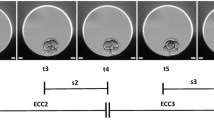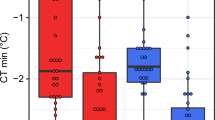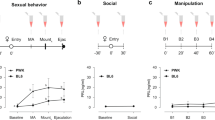Abstract
IF laboratory mice, Mus musculus, are bred in permanently mated pairs in an environment kept at −3° C, their litters are usually smaller at birth than those of controls at 21° C1. Cold adaptation is also accompanied by differences in the relative weights of many organs and tissues2–4. In particular, the gonads, at least of unmated mice, tend to be lighter in a cold environment.
This is a preview of subscription content, access via your institution
Access options
Subscribe to this journal
Receive 51 print issues and online access
$199.00 per year
only $3.90 per issue
Buy this article
- Purchase on Springer Link
- Instant access to full article PDF
Prices may be subject to local taxes which are calculated during checkout
Similar content being viewed by others
References
Barnett, S. A., Quart. J. Exp. Physiol., 49, 290 (1964).
Barnett, S. A., and Widdowson, E. M., Proc. Roy. Soc., B, 162, 502 (1965).
Barnett, S. A., and Mount, L. E., in Thermobiology (edit by Rose, A. S.) (Academic Press, London, 1967).
Barnett, S. A., and Widdowson, E. M., J. Reprod. Fert. (in the press).
Barnett, S. A., Smart, J. L., and Stoddart, R. C., J. Zool., 163, 443 (1971).
Author information
Authors and Affiliations
Rights and permissions
About this article
Cite this article
BARNETT, S., MUNRO, K. Persistent Corpora Lutea of Mice in a Cold Environment. Nature 232, 406–407 (1971). https://doi.org/10.1038/232406a0
Received:
Issue Date:
DOI: https://doi.org/10.1038/232406a0
Comments
By submitting a comment you agree to abide by our Terms and Community Guidelines. If you find something abusive or that does not comply with our terms or guidelines please flag it as inappropriate.



